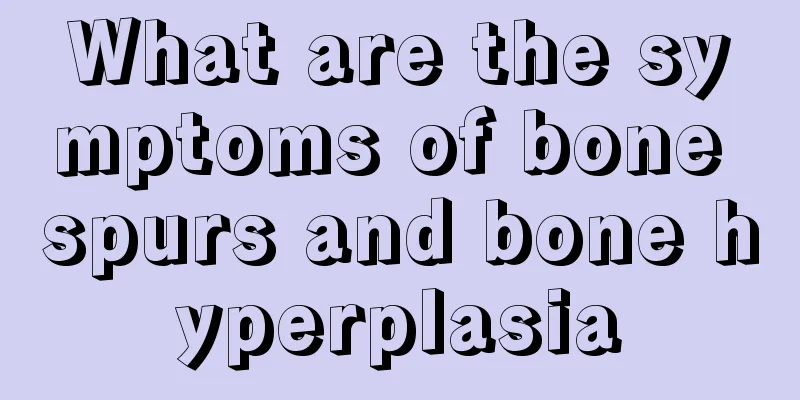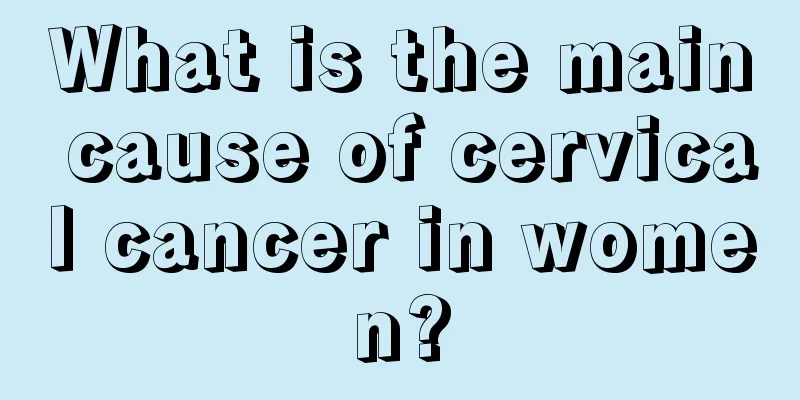What are the symptoms of bone spurs and bone hyperplasia

|
Bone spurs and bone hyperplasia are a relatively common disease, especially in middle-aged and elderly people, who are easily affected by this disease. Common manifestations are cervical bone spurs and lumbar bone spurs. Some people will experience numbness of the fingers, as well as soreness, swelling, and fatigue in the lumbar spine. 1. Symptoms of cervical bone spurs Clinical manifestations: A stiff feeling in the neck, limited movement, snapping sounds when the neck moves, pain often radiating to the shoulders and upper limbs, numbness and electric shock-like sensations in the hands and fingers, which may be aggravated by neck movement. Different lesions affect different parts of the body and cause different symptoms, which can lead to paralysis in the late stages. Severe cervical spondylosis can also cause cervical spondylosis hypertension, cardiovascular and cerebrovascular diseases, gastritis, angina pectoris, dysphagia, etc. 2. Symptoms of lumbar bone spur Clinical manifestations: The most common sites of disease are L3 and L4. Clinically, symptoms such as soreness, distension, stiffness, fatigue in the lumbar spine and lumbar soft tissues, and even limited bending ability are common. If the adjacent nerve roots are compressed, it may cause corresponding symptoms, such as local pain, stiffness, posterior root neuralgia, numbness, etc. Compression of the sciatic nerve can cause sciatica, which can cause severe numbness, burning pain, cramping pain, and stringy pain in the affected limb, radiating to the entire lower limb. 3. Symptoms of knee bone hyperplasia Clinical manifestations: In the early stage, the knee pain is not serious in patients with slow onset, and there is persistent dull pain. The pain worsens when the temperature drops, which is related to climate change. The knee joints are painful and stiff when starting to move after getting up in the morning, walking for a long time, doing strenuous exercise, or standing up from sitting for a long time. The pain improves after a little activity. Going up and down stairs is difficult, and the knee joints become weak when going downstairs, making it easy to fall. There is pain and stiffness when squatting. In severe cases, there is soreness and swelling in the joints, and the patient walks with limp. Those with rheumatic disease have red and swollen joints, deformities, limited functions, and snapping sounds when extending and flexing. Some patients may have joint effusion and obvious local swelling and compression. 4. Symptoms of heel spurs Clinical manifestations: The symptoms are tenderness at the heel and pain in the sole of the foot, which is worse in the morning and lighter in the afternoon. The first step when getting up and walking on the ground is unbearable and sometimes lighter and sometimes heavier. The patient is afraid to use the heel when walking and has a feeling of stone and needles. The symptoms are relieved after activities. Bone spurs grow in the heel area, which is more common in middle-aged and elderly people. |
<<: Why does the stuff between teeth smell so bad? It needs to be removed in time
>>: What are some tips for treating onychomycosis?
Recommend
Several reasons for lumps on the head
If we have a lump on our head, we must not panic ...
There is a white layer on the tongue
Many people have dampness in their bodies, and th...
Recommended treatment for advanced laryngeal cancer
Laryngeal cancer is a common malignant tumor, whi...
How long can you live with advanced bladder cancer?
How long can one live with advanced bladder cance...
Ten-year recurrence rate of early endometrial cancer
Endometrial cancer can be completely cured in its...
What is the pain under the eyes
Pain under the eye is most likely pain in the low...
What are the methods for treating lung cancer? 4 methods are most effective in treating lung cancer
Lung cancer is very familiar to everyone, especia...
What to do if nosebleed occurs due to hot weather
The weather is very hot in the summer. If many pe...
Detailed introduction to the causes of esophageal cancer
According to surveys, esophageal cancer is a very...
Does advanced bladder cancer hurt?
This type of pain is a type of cancer pain, which...
How to care for liver cancer patients? To prevent liver cancer, pay attention to these hidden symptoms
Liver cancer is one of the common diseases. Liver...
What are the dietary treatments for ovarian cancer
In recent years, ovarian cancer has become one of...
Countermeasures for adverse reactions to gastric cancer radiotherapy
Radiotherapy is one of the main treatments for ga...
What is the reason for the thickening of arms?
In daily life, a perfect figure has always been t...
How can I wash off the paint on my clothes
In daily life, paint is used for decoration or re...









